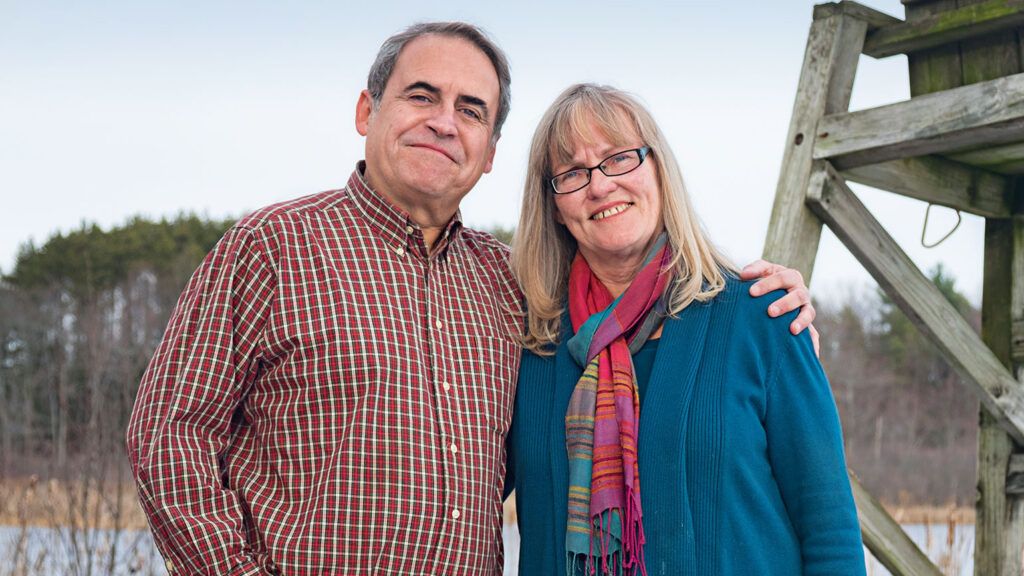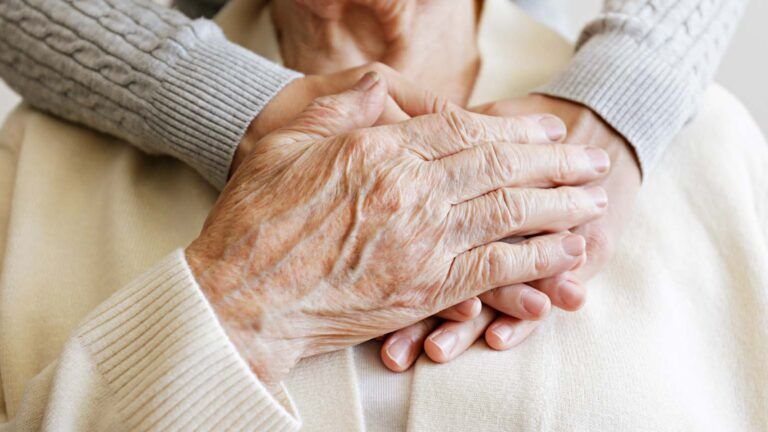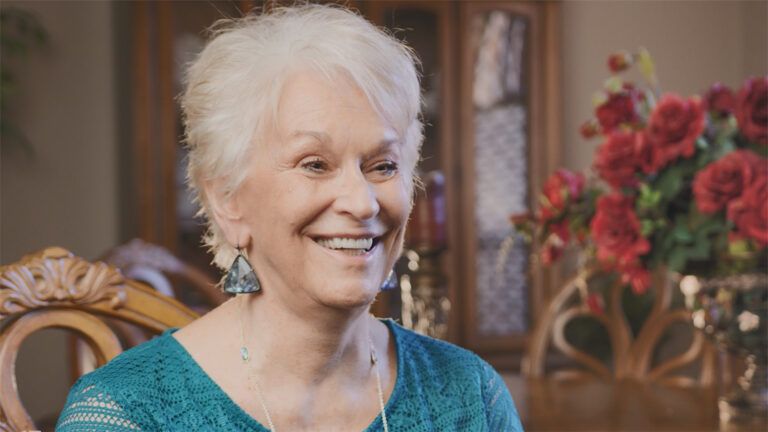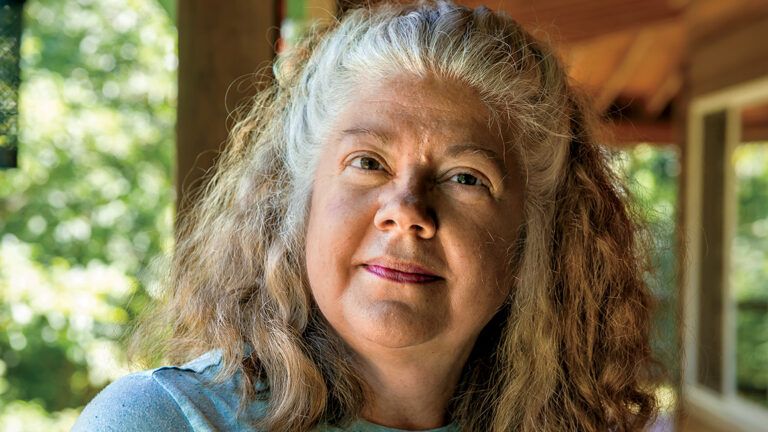I awoke in a bed that was not mine. I was in my brothers’ childhood bedroom. My husband, Carlos, stirred in the twin bed a few feet away. The room, at my mom and dad’s house, still looked like a boys’ room. The shelves were stacked with board games and Hardy Boys books. Toy cars and soldiers cluttered the desk.
Carlos yawned and looked over at me. A few days earlier, my father had died, after being sick for several months. My mom had died a few months before that. Carlos and I had moved in with Dad after Mom’s death. Dad couldn’t take care of himself without Mom. By that point, Carlos and I had been caring for my parents long enough that living at their house didn’t seem like such a big step.
Looking around the room, I felt like a stranger in my own life. Up till now, Carlos and I had been so overwhelmed by work and caregiving, we’d barely had time to talk to each other. We’d communicated mainly through text messages.
BROWSE OUR SELECTION OF BOOKS ABOUT POSITIVE THINKING
Today there were no pills to sort. No appointments to arrange. And our older son, Martin, who’d struggled for years with a drug addiction—as we struggled to help him—was finally in a residential treatment program and making progress.
I didn’t know what to do with myself. I didn’t even know who I was anymore. The look in Carlos’s eyes told me he was thinking the same thing. We’d become caregiving machines that were no longer needed.
Our own house, a few miles away, was a mess. Our younger son had moved out on his own, and we’d hardly been there since moving in with Dad. I shuddered to think what Martin—and the strangers I sometimes found hanging out there when I came by to pick up the mail—had left behind.
Dad’s funeral was over. Family members had returned home. The house was quiet, our to-do list blank. I thought about a morning before Dad died, when Carlos and I had a rare moment to sit down and have coffee together. “How do you take yours?” Carlos had asked, pouring me a cup. With one spoonful of sugar, I reminded him.
That’s how far away from normal life we were. After 30 years together, what husband has to ask his wife how she takes her coffee? The thought of rebuilding our lives felt more daunting than caregiving ever had.
Caregiving has a way of sneaking up on you. We’d started with Martin. He was a great kid who fell in with a bad crowd and eventually spiraled into heroin use. We went through every nightmare you’ve ever heard about addiction. The anxious late nights. The dashed hopes for recovery. The run-ins with police.
Then Mom and Dad needed us. They were in their nineties and mentally sound, but their bodies began to fail. Mom fell one Thanksgiving and went to the hospital. She came home after months of rehab but began to have lapses in lucidity and became almost totally blind from macular degeneration. Dad’s own health issues made it hard for him to get out of bed.
Little by little, Carlos and I took on more responsibilities. We prepared meals. Ran errands. Managed their medications. Shuttled them to and from appointments.
We did all this while holding down full-time jobs, me as a supervisor of a special-education program, Carlos working for a software company. Our leisure time—my writing, Carlos’s artwork, our walks around the lake near my parents’ house—were cast aside. Vacations were out of the question. Our social life dwindled to the occasional phone call to friends.
READ MORE: 7 WAYS FOR CAREGIVERS TO KEEP THEIR MARRIAGE STRONG
When Mom died suddenly of a stroke, it seemed logical to move in with Dad. Mom had been the love of his life. He was sad and lonely. We were grateful we could be with him.
At first we barely noticed how all of these changes—which we took on gladly—consumed our lives. Every morning I awoke in my brothers’ old room, made coffee, set out Dad’s pills for the day, threw in a load of laundry and embarked on my grueling commute to work. Carlos made breakfast for Dad and helped him get dressed before heading to work himself.
We anguished over Martin, trying our best to check on him and steer him toward sobriety. But at some point, Dad’s needs became too great and we had to resign ourselves to the bleak reality that our son’s deliverance was beyond our control.
And then all of a sudden it was over. Martin, sick of living as an addict, entered a long-term residential treatment center. A month later, my father died. It was October, the days growing shorter. Thanksgiving loomed, the first we would spend without my parents. Life itself loomed. Who were we now? What next? So much of our identity had been wrapped up in being caregivers.
Not knowing what else to do that morning, we got up out of those twin beds and sat together at the kitchen table, marveling at the quiet and missing my dad’s presence.
The magnitude of the task before us seemed insurmountable. It wasn’t just Mom and Dad’s affairs to put in order. It was our lives we had to rebuild. Our marriage. Even our house! We gazed at each other, wondering where to begin.
In our bewilderment we turned to God. Somehow we’d managed to keep up a daily prayer routine throughout even the most challenging times of caregiving, often praying with each other by phone. This morning, we asked God to show us what to do now.
There was no miraculous answer, but we got up from the table feeling as if we should at least get started on something. We set to work on Mom and Dad’s house. We spent a few days cleaning, sorting and putting away unneeded medical equipment. The job was comforting. It felt like we were doing one last thing for Mom and Dad.
But I knew we were putting off the inevitable return to our own house—and the hard decisions about our future. At last we closed and locked Mom and Dad’s door and drove home.
We pulled into the driveway and our spirits sank. The lawn was overgrown, the entryway cluttered with empty soda bottles and bags. A bird had built a nest in last year’s Christmas wreath, still hanging by the front door. Every room was filled with clutter and dust.
“Maybe we’ve finally met our Waterloo,” Carlos said, laughing in disbelief.
READ MORE: 10 CAREGIVING HACKS TO MAKE LIFE EASIER
We went room to room, discovering missing slats in our lovely louvered closet doors, countertops piled with dirty dishes, cobwebs hanging from the ceiling, and broken lamps and furniture.
Eventually we overcame our shock and got to work. We threw out old stuff, sorted through boxes and closets, dusted, vacuumed and scrubbed. It was days before the house felt habitable.
One afternoon, opening a trunk at the back of a closet, we found a box with the love letters we’d written to each other 30 years earlier. Work stopped and we sat on the floor, reading the letters out loud, remembering what it felt like to be newly married, with kids far in the future and parents healthy and capable.
“You know, it’s almost like we’re back in that time,” Carlos said. “It’s just us now.” His words stirred something inside me, though I wasn’t sure what.
Carlos’s family is from Buenos Aires. Through a work connection, a South American company contacted us, asking if we’d be able to help translate its website for a planned expansion into the United States.
A freelance job. We didn’t have time for such things, even though the website sounded like a perfect blend of our professional skills. But then I remembered that time was exactly what we did have now. We took the job and discovered we loved working together. Days fell into a routine of work, the house and the website.
Thanksgiving got closer. We’d always spent holidays at my parents’, where Mom presided over the kitchen and Carlos made everyone his signature café con leche. This year it would be only a painful reminder of loss.
“What if we went to Argentina and spent the long weekend with my family?” Carlos asked. An inspiration! We’d still be with family. And it would be a vacation.
The trip was wonderful, a bit like a second honeymoon. We luxuriated in the long flight—time to read! We took walks around Buenos Aires, visiting places we’d known when we lived there early in our marriage. Immersed ourselves in the warmth of Carlos’s family.
READ MORE: 7 TIPS FOR COPING WITH CAREGIVING EMOTIONS
We returned home energized. We finished the website and turned our full attention to our house. We fixed what was broken, bought new furniture and hung new pictures on the walls. I even found an affordable set of louvered closet doors at Habitat for Humanity that matched the broken ones.
On a roll now, I realized there were other things in our lives that needed changing. I left my special-education job—the commute wore on me even when I didn’t have to worry about taking care of Mom and Dad and Martin— and picked up a few more classes at the community college where I’d taught occasionally. Suddenly I had even more time on my hands.
I began calling friends I hadn’t talked to in ages. Writing. Cooking. Spending time with my younger son and with Martin, who graduated from the rehab program, found work and stayed sober. What an answer to our prayers! God is good. Carlos resumed his artwork, and we spent more time at the lake near my parents’ house.
One Saturday we went to a rhubarb festival in a neighboring town. Even though, as Carlos reminded me, “we don’t eat rhubarb.”
“I know. But let’s go anyway. It’ll be a pretty drive.”
The festival turned out to be fun. There was live music, antiques for sale, a stand where I bought some perennials for the garden. We tried some pancakes with rhubarb syrup…delicious.
On our way back to the car, I stopped at a table with antique silverware. An old sugar spoon caught my eye. “Look at this one,” I said to Carlos.
“Pretty,” he said. “But we already have sugar spoons. One spoonful in your coffee, remember?”
We were almost to the car when I stopped. “Wait,” I said. I hurried back to the silverware table. The spoon was still there. I picked it up, turned it over. Engraved on the back were what looked like two letters, L and H. My initials! I looked a little closer. The second letter wasn’t an H. The engraving was in Spanish: L y C.
L and C. Lynda and Carlos.
I bought the spoon and ran back to the car to show Carlos. We laughed at how clearly God was showing us he knew who we were, even when we were so busy taking care of others that we forgot ourselves. He would be with us as we moved forward, rediscovering ourselves, our marriage.
One evening not long ago, I sat in the living room doing some writing on my computer. Carlos sat by a window, sketching. A fire burned in the hearth. I looked around the room, now a blend of our old and new lives.
There was the cane rocking chair where we’d rocked the kids to sleep and the South American poncho we’d received as a wedding gift. But there was also the comfortable new furniture we’d bought. Carlos’s painting of the lake where we took our walks. A cuckoo clock we’d gotten on a whim just because we could do things like that now.
I thought back to the time we’d spent sleeping in my brothers’ old bedroom—a symbol both of how much we loved my parents but also how much caregiving had taken over our lives.
We’d thought then that we might never reclaim ourselves. But all along, we’d been shepherded by the greatest Caregiver of all. He’d prepared this time for us. This very moment here in our peaceful living room. Slowly, patiently, with infinite care, he’d guided us home.
Did you enjoy this story? Subscribe to Guideposts magazine.
For more inspiring stories, subscribe to our free Your Weekly Inspiration email newsletter!






